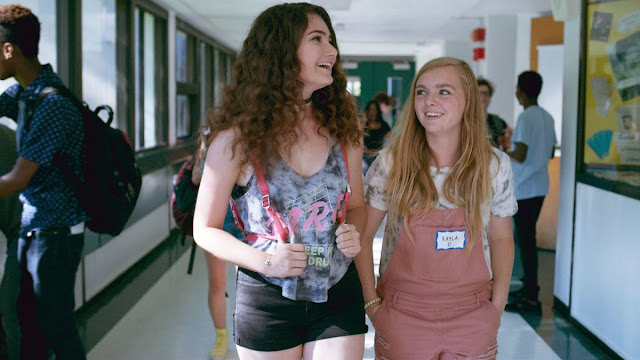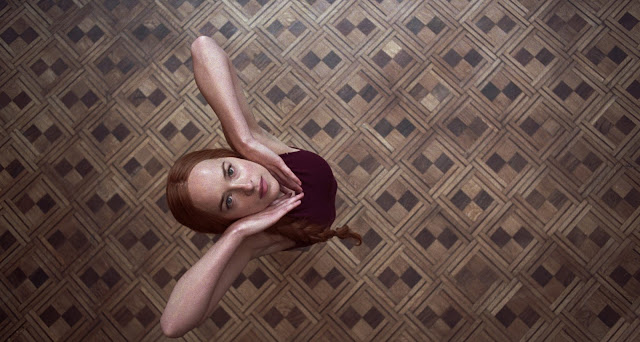Check out the entire series here.
Film often gets singled out as the most subjective art form. Dialogue and narration reveal a character's thoughts. Cinematography unlocks their aesthetic and the impact of environment. Close up shots of skilled performers access microgestural, repressive, and unconscious functions that aren't so easy to put into words. Editing sets the rhythm and music drags us through the emotional complexity of the moment. Given that all these tools so powerfully engender empathy for the subjects at hand, cinema is in a unique position to teach us about oppression. How does it work, why does it work, and what does it do to its victims?
Oppression is an abstract and flexible concept that can take many forms. Structural oppression manifests differently for race, gender, sexuality, ability, age, species. These ten films feature struggles amongst those categories, sometimes multiple at a time. Forging that bond of empathy helps us understand the oft invisible machinations of oppressive forces, and perhaps more importantly, it helps us learn how to fight back.
30. Jackie
Most biopics are didactic trash. They tend to either limply gloss an entire life, or hyperfetishize that life's most marketable moment. Jackie finds the sensitive middle ground. The film examines Jackie Kennedy's reflections on the week following her husband's murder, the fallout thereof, and her project of codifying JFK's legacy. Not beholden to chronology or literalism, Jackie couches these reflections in an intimate interview. This complicates the narrative by having it filter both through Jackie's subjectivity, and her desire-- she shapes her own personal history just as she does her late husband's. Thus Jackie moves beyond a cold retelling into the fascinating territory of intentional myth and the motivations behind it.
Biopics about political figures have the added baggage of US propaganda. Jackie by and large avoids this pitfall as well, incredibly rare for a story surrounding the president. I credit this stunning accomplishment to the outsider status of director Pablo Larraín. Larraín, a native of Chile, would at first seem an odd choice to helm the story of Jackie Kennedy, but his work features the clear-eyed observations of a man not raised under the fog of the American propaganda machine.
29. The Neon Demon
Director Nicolas Winding Refn is an aesthete first and foremost; blending his eye for surfaces with the inhumane world of LA modeling is a delectable match made in hell. Elle Fanning plays a freshfaced young model trying to break into the scene despite jealous peers and powerful predatory men. Fanning is absolutely stunning every second of the runtime. Her arc takes her through violence, revelation, transcendence, and even into the supernatural. The real standout, though, is the coupling of Refn's dreamy visuals and Cliff Martinez's pulsing score.
So... Are you food, or are you sex?
28. Under the Skin
Scarlett Johansson's career has been preoccupied with the idea of beauty, and how it correspond to what roils beneath. This thematic fixation has led to wildly mixed results, from the mesmerizing (Her, Ghost World) to the deeply regrettable (Ghost in the Shell, or her aborted attempt at playing a trans man). Under the Skin is her masterpiece, an uncanny expression of performative attraction.
Much of this brilliance is generated by the opportunity of playing something otherworldly. Johansson's protagonist (?) is an alien creature who takes the form of a beautiful woman, beguiling men to follow her back to her lair. She cruises around, an implacable huntress, always hungry. These scenes are crackling with naturalism, partially owing to the decision to film Johansson interacting with real dudes on the street. The lullaby pace of these nighttime sojourns is interrupted by gruesome horror when these men spring her trap...
27. Eighth Grade
Bo Burnham, shock youtube songster, has grown into himself. His stand up specials display a craftsmanship and maturity far beyond the already interesting work he was doing on youtube. This year's Inside is the first great work of art about COVID quarantine. Before the world got shut down, though, he made an even more impressive leap from stage comedy to film directing. Most impressive of all, the project was an intimate look at the emotional and social world of an eighth grade girl.
Burnham's signature "look at me" style is entirely absent from the film, allowing star Elsie Fisher to run away with the movie. Adults so often look at childhood as 'the good old days.' I wonder if they have entirely repressed the anxiety and trauma of childhood. Burnham and Fisher work together to bring it all rushing back. Small moments take on immense gravity, as when Fisher looks plaintively through a sliding glass door at a pool party she is supposed to enjoy. The stakes are so high. Compounding this anxiety is the way Burnham stylizes the simple act of scrolling through Instagram so as to open up ideas about gender, online masks, and the manic schizophrenia that is caused by having the world at our fingertips.
26. The Lobster
The first peculiarity of many peculiarities in The Lobster is the astonishing cold open. The second peculiarity of many peculiarities is the bizarre cadence of the line deliveries. This romance/horror/comedy/drama takes place in a parallel world in which singles are lower class citizens who are forced to find a mate at a peculiar resort, or else be turned into an animal for the rest of their days. It's satire, yes, but it's also a fully fleshed out world of its own, one with achingly depressive social norms. The film is both delightful and utterly cynical, a tricky combination to pull off. None better to anchor this project than Colin Farrell, who can make us smile then shudder at the drop of a hat.
25. The Mermaid
The Mermaid is probably one of the shaggier films to be found on this list, but I love it so dearly. It tells the story of a clan of mermaids who are being hunted to extinction by an evil corporation that wants to develop their ancestral land into a crummy resort. It's an anti-capitalist epic, a goofy comedy, and a surprisingly touching love story all wrapped into one. Also, for a moment or two, a musical. The experience is uneven in a charming way, such that even the lows carry moments of poignancy. There are several moments of casual misogyny that are entirely salvaged by the performance of lead mermaid Lin Yun, a maniacally batty ingenue. It's hard to make caring about the environment enjoyable, but it goes down smoother when the material is so funny. The Mermaid contains some of my favorite sight gags of all time-- shout out to the police officer who attempts to sketch a mermaid without knowing what one is.
24. Tangerine
Tangerine is one of those film watching experiences that broadens your horizons both about what is possible on the screen, and what is possible in our world. The story follows two trans sex workers blitzing through another day in the life, facing both interpersonal and extrapersonal drama. When I say it follows them, I do mean follows. The film is a pioneer of iPhone cinema, and the effect makes everything seem intimate and urgent. Yet the brilliant cinematography would all be for naught had they cast the wrong leads. Trans actresses Kitana Kiki Rodriguez and Mya Taylor (who had no major acting experience before this) portray their characters with love, care, and a whole bundle of jagged edges. The result is a rare movie that feels real, as real as you can get through the mediation of an art form.
23. Suspiria
The original Suspiria is iconic, a shock of color and light that titillates the senses even as it churns the stomach. The Suspiria remake had an uphill battle to stand its ground against that legacy. Somehow it manages to be entirely different in every way, yet still feel like a worthy successor.
The film is about a famous contemporary dance studio in Berlin that has a lot of witch stuff going on, as if the extreme pressures of professional dance were not enough for these young woman to deal with. Tilda Swinton dominates the movie with a trio of extraordinary performances, but it is the horror setpieces that linger longest in the memory. I cannot think of the body puppet mirror movement sequence without cringing. And the bloody climax of the film... well, the less said about one of the most jaw-dropping scenes of the decade, the better.
22. Nightcrawler
Nightcrawler is an inspiring rags to riches story about a young American man who works his way up in the news industry from nothing. At least, that's what the elegiac James Newton Howard score would have you believe. It's actually the story of a ratfink sociopath who uses his intimate knowledge of the norms of capitalism to manipulate and exploit everybody around him. No better landscape for this drama than the local news, a seedy hive of white fright and torture porn designed to convert racial anxiety into ratings. Jake Gyllenhaal is at career peak form here with a skincrawling performance. His character Lou Bloom understands better than anyone that we occupy a crumbling social order, and he concludes all too easily that the only solution is to claw your way to the top.
21. The Florida Project
Working with child actors is difficult. Working with child actors on a project striving for naturalism is orders of magnitude harder. What director Sean Baker (also of Tangerine) accomplishes here is no less than a miracle. We spend the entire runtime only glancingly encountering adults, for The Florida Project is invested most of all in showing us the world of children. Children playing, talking, hanging out, committing mischief, growing up, overcoming obstacles, making mistakes. It's a movie that washes over you, just as a long summer day stretches on for a little kid. Contextualizing it all is the titular project, a den of poverty on the outskirts of Disney World. These kids are given so much freedom because their families don't have the money to do anything else with them, and that's when the clamp of growing up tightens around our throats.











No comments:
Post a Comment